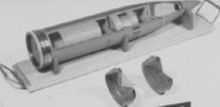M687

The M687 is an American 155 mm binary sarin chemical weapon artillery shell. The design was standardized in 1976 and production began on December 16, 1987 at Pine Bluff Arsenal, Pine Bluff, Arkansas. Production was halted three years later, following a June 1990 chemical weapon destruction treaty with Russia, and the dismantling of existing stocks began in November 1997 at Hawthorne Army Depot, Nevada. America's remaining stocks were stored at the Deseret Chemical Depot, Utah, and the Umatilla Chemical Depot (Umatilla County, Oregon).
The shell contained two canisters separated by a rupture disk. The compartments were filled with two liquid precursor chemicals for sarin (GB2): methylphosphonyl difluoride (denominated DF) and a mixture of isopropyl alcohol and isopropyl amine (denominated OPA) is in a second canister. The isopropyl amine binds the hydrogen fluoride generated during the chemical reaction. When the shell was fired the force of the acceleration would cause the disk between them to breach and the spinning of the projectile facilitated mixing. The two precursor chemicals would react in flight to produce sarin and when the shell reached its target the sarin would be released.
The shells were meant to be stored and transported with only the OPA compartment loaded; the fuze and the DF compartment would be inserted shortly before firing.
The M687 was never used in combat and, under the Chemical Weapons Convention, the U.S. destroyed the shells and the precursor chemical DF as part of its agreement to eliminate all chemical weapons. More than 258,000 of the shells were shipped to Hawthorne Army Depot from their storage at Deseret Chemical Depot, Utah, and the Umatilla Chemical Depot, Oregon and were destroyed by July 1999. The last of the U.S.'s stockpile of DF was destroyed on April 6, 2006.
See also
- Chemical Weapons Convention
- M110 155mm Projectile
- M121/A1 155mm Projectile
- M104 155mm Proectile
- M55 rocket
- United States and weapons of mass destruction
External links
- The M687 @ The Federation of American Scientists
- The U.S. Army Chemical Materials Agency (CMA) - Binary Chemical Weapons